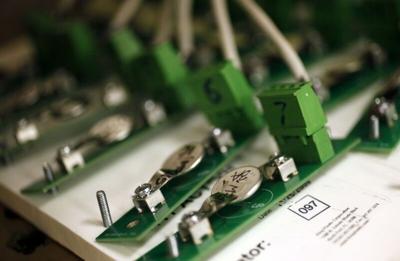A new facility slated to open later this year could make Madison a hub in the manufacturing process for rechargeable batteries and aid other U.S. companies in developing new technologies.
Orbia Fluor & Energy Materials, a business group within Mexican chemical manufacturing company Orbia, is converting an 11,000-square-foot building near the Beltline and Interstate 90 interchange into a production center for the electrolytes used in the batteries of everything from cell phones to military equipment.
Lithium-ion batteries consist of a positive electrode, a negative electrode, and lots of lithium ions traveling through a substance called electrolyte. When a battery is fully charged, all its lithium ions are at the positive electrode. As the battery uses its charge, they move toward the negative electrode until they’re all at the negative electrode and the battery is fully depleted.
Electrolyte allows that “charge transfer” to happen, and each type of battery uses a different electrolyte recipe. Orbia Fluor & Energy Materials’ new facility will produce custom electrolytes by blending lithium salts, solvents and additives in the ratios each of its clients need.
“There's only a couple other companies in the United States that do this,” said Carl Thoemmes, who leads business development for the company’s battery materials division. Those other U.S. electrolyte manufacturers primarily produce the type and volume of electrolytes needed for electric vehicles.
Companies that make much smaller batteries and buy electrolyte by the barrel rather than the train-car load have typically had to rely on electrolyte suppliers in Southeast Asia, Thoemmes said.
That can mean longer waits, higher costs and more logistical challenges, he said. “You can't just put a 5,200 kilogram drum full of electrolyte on an airplane. It has to go by boat … and clear Customs.”
That’s why Orbia Fluor & Energy Materials started manufacturing custom electrolytes last year at its existing Technical Center of Excellence research and development center at 3587 Anderson St. With the new facility, the company anticipates scaling up production from about one ton per year to around 400 tons a year. It expects to deliver its electrolyte to clients within four weeks, about twice as fast as its international competitors, Thoemmes said.
“We’re localizing supply and enabling (U.S. companies) to develop faster and more cost-effectively,” Thoemmes said. “We’re closing a critical supply gap.”
So far, the company’s clients include battery manufacturers Navitas Systems, Enovix, Lithion Battery and Forge Nano. The company’s efforts to build a domestic electrolyte supply have also caught the attention of the U.S. military, which buys technology that uses lithium-ion batteries. Recently, the Department of Defense awarded the company an $8.4 million contract.
The company plans to hire 36 new employees for the facility by 2026. The lithium-ion battery chain is expected to grow by more than 30% each year from 2022 to 2030, ending with a market value of more than $400 billion, according to a report released last year by consulting firm McKinsey & Company.
Orbia Fluor & Energy Materials acquired Madison battery technology startup Silatronix in 2021. Started by University of Wisconsin-Madison professors Dr. Robert West and Dr. Robert Hamers in 2007, Silatronix initially focused on developing and producing a single electrolyte component called organosilicon to make lithium-ion batteries safer and more efficient, reducing the chance that they would catch fire or explode.
Editor's note: This story has been updated to clarify references to Orbia Fluor & Energy Materials and its Technical Center of Excellence.



